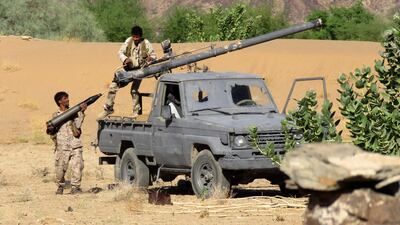The latest Houthi assault on Yemen's Marib governorate is threatening the lives of millions of civilians trapped inside the battle zone, aid agencies said on Thursday.
The gas-rich region is the internationally recognised government’s last stronghold in northern Yemen and hosts more than two million internally displaced people.
But the province, and its capital city, have in recent months become the focal point of the war in Yemen — a conflict which has already killed tens of thousands of civilians and pushed the country to the brink of famine.
“Marib city hosts more than two million internally displaced people [IDPs] — almost 70 per cent of the IDPs in Yemen,” said Basheer Omar, a representative for the International Committee of the Red Cross in Yemen.
“If the conflict reaches the city, then it would be a disaster for them,” he told The National. “They will be faced with very difficult choices”.
For years, the ICRC has been pushing Yemen’s warring sides to give civilians safe passage out of the conflict zones and have demanded that those who remain be “respected and not attacked,” he said.
“Every party has an obligation to treat the wounded and to search for and recover the bodies of people who have been killed during the fighting — irrespective of which side they belong to,” Mr Omar said.
Lack of food
Those who have arrived in Marib city since fighting intensified in the province face severe food shortages, he said, but international agencies are trying their best to meet civilians' needs.
The safety and protection of civilians in Marib is the Norwegian Refugee Council’s immediate concern, agency spokesman Karl Schembri told The National.
“In just the first six months of this year, more civilians there were killed or wounded than in the previous two years combined,” he said, and added that the council can only reach a small portion of those in need.
“We call on all parties to ensure that we can reach the most vulnerable in Marib and to spare civilians,” Mr Schembri said.
Many of those that have fled to Marib over the years live in overcrowded areas that are now surrounded by the fighting, cut off from essential services and humanitarian aid, he said.
“Those that have fled lack some of the most basic essentials like clean water, latrines, power and health facilities. Families, including children, are sleeping out in the open,” he said.
Despite UN and US calls for peace, no ceasefire agreement has been struck. International aid agencies are urging the warring sides to reach a settlement.
“We call on all parties to ensure that we can reach the most vulnerable in Marib and to spare civilians,” Mr Schembri said.
For the ICRC, the most important thing is to ensure that both sides reach a political solution so that civilians are able to live a dignified life, Mr Omar said.
“Without a solution, the suffering of Yemeni people will continue for a long time.”







